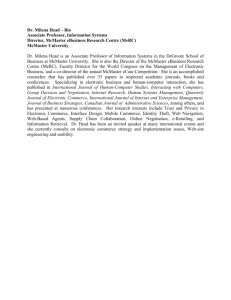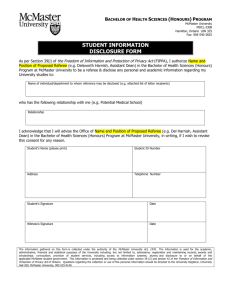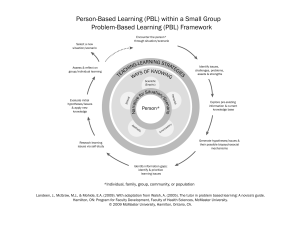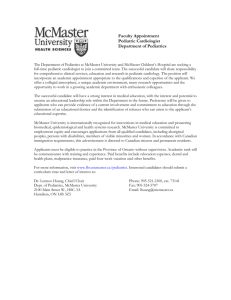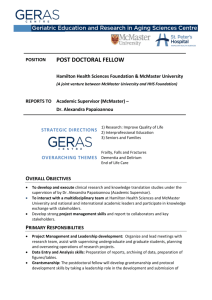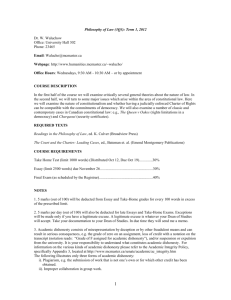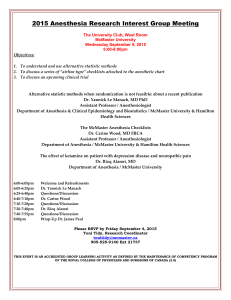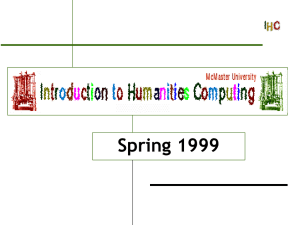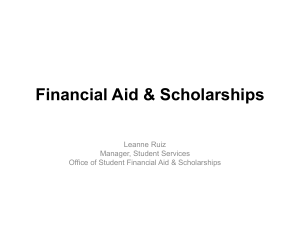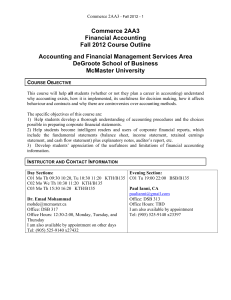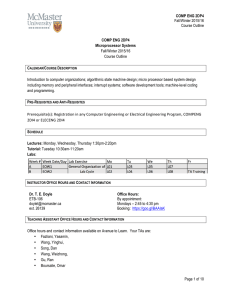NCCMT Learnings
advertisement
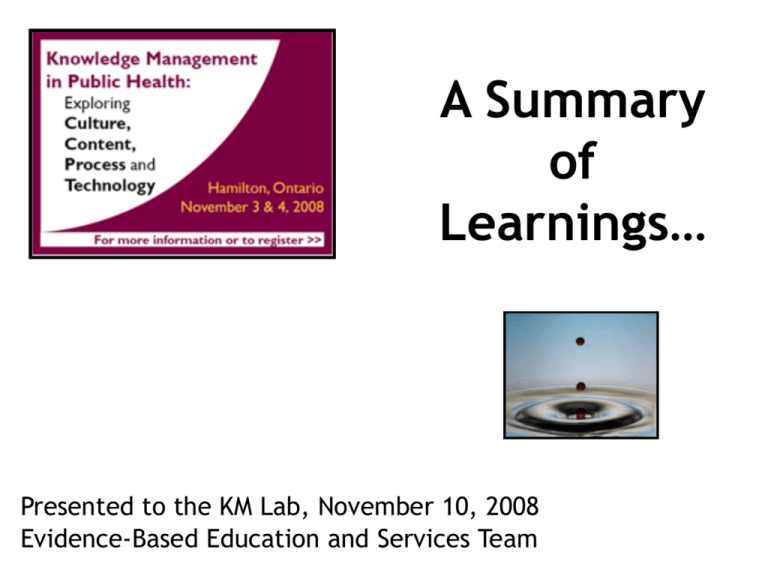
A Summary of Learnings… Presented to the KM Lab, November 10, 2008 Evidence-Based Education and Services Team NCCMT • National Collaborating Centre for Methods and Tools • Funded by Public Health Agency of Canada • One of six National Collaborating Centres (others include, Aboriginal Health, Health Determinants, Infectious Diseases, etc.) • Overall mission is to translate existing and new evidence in public health • NCCMT is focussed on improving access to, and use of, methods and tools for KTE • Hosted by McMaster University Speakers • Sir J.A. Muir Gray, Director, National Knowledge Service • Brian Haynes, Professor, Clinical Epidemiology and Medicine, McMaster • Stephen Kingston, President, MediaDoc • John Lavis, Canada Research Chair in Knowledge Transfer and Exchange, McMaster • Kirby Wright, President, Knowledge Resources, Inc. Clean, Clear, Water • In 19th century, health was transformed by provision of clean clear water • In 21st century, knowledge is the analogue of water ~ the provision of clean, clear, knowledge is the responsibility of public health Sir Muir Gray Keynote The future is not a destination waiting for our arrival…we need to imagine it, plan it, and build it… In fact, the future is here now, it is just not evenly distributed. There are puddles of excellence and innovation everywhere. Major problems in Health Care not solved by more Science… • • • • • • Errors Poor quality health care Wasting of resources Variations in policy and practice Poor patient experiences Overenthusiastic adoption of interventions of low value • Failure to get new, high value, evidence into practice The Water Metaphor • Rubbish sinks to the bottom (controlled trials help with the sift) • Filter (systematic reviews) • Aquaduct (knowledge needs to move!) • Water tank (chief knowledge officer houses best evidence for the organization) • Tap (knowledge flows clean and clear when needed) • Water quality reports (knowledge control inspections) Questions from the Audience… • How do we make them thirsty? • Water flows through the path of least resistance – how do we ensure that the best knowledge flows? • What support is there for knowledge officers to bring all of the information together, from diverse content areas? • Knowledge lies around in puddles and water jugs, how can we organize this? • Putting a tap in my house is a messy and difficult job, when going to the waterhole is what my grandmother and her grandmother have always done…(managing resistance to change) • Is our job filtration and marketing, like bottled water? Providing Current Best Evidence for Decision-Makers • Past: Passive Push Diffusion (publish and they will come) • Recent past: Pull Techniques (teach critical appraisal and search techniques) • Current: Augmented Push (central synthesis and send to a targeted group) • Current: Augmented Pull (infiltrate their common sources with evidence so they read it when they come) Brian Haynes Session Augmented Push: Example • McMaster Plus 60,000 articles Critical appraisal process 3,500 articles per year 3,500 articles Relevancy Filter 25 articles per year http://plus.mcmaster.ca/EvidenceUpdates http://plus.mcmaster.ca/KT Enabling Knowledge Management through Web-Based Technologies • Technology was first used for marketing, increasingly, it is used to facilitate interactivity • Tools to: – – – – Create Capture Share Leverage Stephen Kingston Session Tools to Create and Capture • Blog (free: wordpress) • Wiki (free: mediawiki) • Document libraries (pay: livelink) – Electronic repository of documents • Web analytics (free: google analytics) • Translation management (pay: claytablet) • Collaborative workspaces (free: google documents) Tools to Share and Leverage Share • All of the above, plus… • Videoconferences / webinars (pay: livemeeting) Leverage • Community of Practice Want to stay current? Digg.com reddit.com Evaluating Innovative Approaches to Policy Briefs and Deliberative Dialogues • Barriers to Research Use: – Research is not valued as input in decisions • Create a climate for research use – Research is not relevant to critical decisions • Produce research that is relevant – Research is not easy to use • • • • • Translate research into the language of the organization Communicate findings effectively Facilitate pull Prompt professionals to use research Provide a forum for conversations about research John Lavis Session Policy Briefs • Mobilize global and local data, and highlight local applicability – What is the problem? – Three research-based options for addressing the problem (and likely costs and consequences) – Relevant implementation considerations Deliberative Dialogue • Six features: – Purpose – a full discussion of a relevant issue – Pre-circulated Policy Brief – Participants include decision-makers, those who influence decisions, those who implement decisions – Chaired by skilled, neutral facilitator – Participants positioned to champion the efforts of the group – Chatham House Rule Future Directions for Knowledge Management • Call to Action towards a National Knowledge Service (Muir Gray) • Require a culture of inquiry • Need to harness the power of communities • Content (research) is important, but so are connections • Storability is different from “findability” (we need to be as good as Google with access) • Appreciate the complexity of the task Kirby Wright, Closing Keynote First Principles • What do we know about decision-making? – We think we are logical, but most often we use heuristics and past pattern matching to affect the Situation Action scripts generates.. Cues that activate Patterns that let you recognize… We need to change the patterns to include consideration of evidence! The types of problems we face • Simple (baking a cake) • Complicated (a rocket to the moon) • Complex (raising a child) • Our problems are complex (multiple variables, not sure of end state, no defined script…) – the answer is not in a research repository! Social Dimensions of Knowledge • Learning is about work, work is about learning, and both are social • Communities of Practice lend themselves to situated learning and inquiry • Knowledge Management is founded on research and relationships In summary… • KM is important! We need to create, share, and manage knowledge – this should be a core part of our work • Start with the decisions that need to be made – how can evidence be brought to bear? • Layered, interconnected learning – recognize the change process • KM is more than content transfer – it is dependent on attention to relational issues

